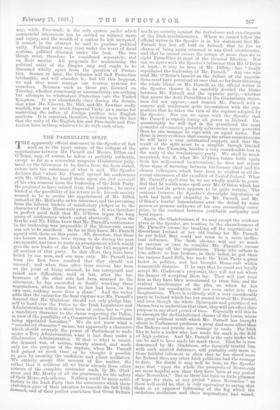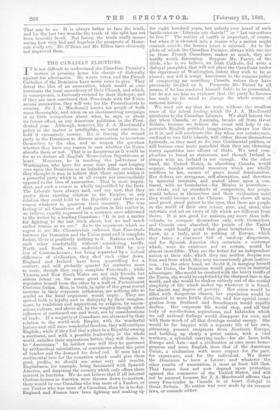THE PARNELLITE SPLIT.
THE apparently official statement in the Speaker of last wee as to the exact nature of the collapse of the negotiations between Mr. Parnell and Messrs. Dillon and O'Brien, may, of course, be taken as perfectly authentic, except so far as a somewhat sanguine Gladstonian judg- ment on the inferences to be drawn from the facts stated, enters into the substance of what is said. The Speaker declares that "when Mr. Parnell opened his conferences with Mr. O'Brien, he based them upon the fait accompli of his own removal from the leadership of the Irish Party. He professed to have retired from that position ; he never hinted at the possibility of his return to it ; his sole anxiety seemed to be to secure the appointment of Mr. Dillon instead of Mr. McCarthy as his successor, and the procuring from the Liberal leaders of satisfactory pledges as to the character of their Home-rule proposals. It was therefore in perfect good faith that Mr. O'Brien began the long series of conferences which ended abortively. From the first he and Mr. Dillon knew that Mr. Parnell's continuance in the leadership was impossible if the Home-rule cause was not to be sacrificed. So far as they knew, Mr. Parnell agreed with them on this point. All, therefore, that these two honest men have been trying to do during the past two months, has been to make an arrangement which would give the new leader of the Trish.Party the full support of all sections of that party. In this effort they have been foiled by one man, and one man only. Mr. Parnell has from the first been resolved that they should not succeed ; and when time after time success has been on the point of being attained, he has interposed and raised new difficulties, until at last, after the for- bearance of the other side had been strained to the uttermost, he has succeeded in finally wrecking these negotiations, which from first to last had been, in his own case, nothing more than a• sham." And the writer adds that the excuse for the final rupture was Mr. Parnell's demand that Mr. Gladstone should not only pledge him- self to hand over the Police to the Irish Legislature and Administration within a short term of years, but to "give a mandatory character to the clause respecting the Police, in view of the possibility of a, Conservative Lord-Lieutenant being appointed hereafter." We do not know what a "mandatory character" means, but apparently a character which should overrule the power of Parliament to undo under a Tory Administration what it had done under a Gladstonian Administration. If that is what is meant, the demand was, of course, utterly absurd, and made only for the purpose of the rupture, when Mr. Parnell had gained as much time as he thought it possible to gain by amusing the credulous and pliant mediators. We entirely accept this account of the matter, the rather that it confirms all we know already from other sources of the complete surrender made by Mr. Glad- stone and Mr. Morley of all the guarantees for the safety of their Home-rule scheme. Nothing could be more satis- factory to the Irish Party than the assurances which these statesmen gave of their intention to concede the full Irish demand, and of their perfect conviction that Great Britain needs no security against the turbulence and exactingness of the Irish revolutionaries. Where we cannot follow the official writer in the Speaker is in his statement that Mr. Parnell has lost all hold on Ireland, that he has no chance of being again returned in any Cork constituency, and that he cannot ensure the return of more than six or eight Parnellites at most at the General Election. Nor can we agree with the Speaker's inference that Mr. O'Brien at least,—it may be true of Mr. Dillon,—has "finally repudiated the leadership of Mr. Parnell." Any one who read Mr. O'Brien's lament on the failure of the negotia- tions must have perceived at once that, so far from throwing the whole blame on Mr. Parnell, as the official writer in the Speaker throws it, he carefully divided the blame between Mr. Parnell and the opposite party,—whether that meant the Anti-Parnellites or the Gladstonian states- men did not appear,—and treated Mr. Parnell with a reserve and tenderness quite inconsistent with the sup- position that he takes the view of the rupture adopted by the Speaker. Nor can we agree with the Speaker that Mr. Parnell is rapidly losing all power in Ireland. Un- questionably he will find in the priesthood the most powerful adversaries, probably adversaries more powerful than he can manage to cope with on equal terms. But there is every evidence that among the urban constituencies he will have a very substantial support, and that the result of the split must be a tangible though limited gain to the Unionists, besides a very considerable loss to the unity of the revolutionary party. We shall be much surprised, too, if, when Mr. O'Brien issues forth again from his well-earned incarceration, he does not repeat those signs of -wavering between his former chief and his chosen colleagues, which have been so evident in all the recent utterances of the ex-editor of United Ireland, What Mr. Parnell's spell may be, we are wholly unable to guess. But that he wields some spell over Mr. O'Brien which has not yet lost its power, appears to be quite certain. The contrast between the Speaker's downright imputation of both bad faith and stupidity to Mr. Parnell, and Mr. O'Brien's tearful lamentations over the defeat by some person or persons unknown of his own reconciling enter- prise, is the contrast between justifiable antipathy and loyal regret. Again, the Gladstonians, if we may accept the evidence given in the Speaker, are trusting to the shamelessness of Mr. Parnell's excuse for breaking off the negotiations to disenchant Ireland of her old feeling for Mr. Parnell. In our belief, they could not trust to a more ineffec- tual influence. The Irish electors will not so much as canvass or care to consider Mr. Parnell's excuse for breaking off the negotiations. Those who adhere to him, adhere to him because, in their belief, he got them the various Land. Bills, has made the Irish Party a great factor in politics, and has brought Home-rule within measurable distance. If he says that he .could not loyally accept Mr. Gladstone's proposals, they will not ask where the danger of accepting them lay. They will just trust him as they have been accustomed to trust him, and the evident baselessness of the plea on which he has grounded his repudiation will not even enter into their imaginations. There is evidently still a very considerable party in Ireland which has not ceased to trust Mr. Parnell, and even though the whole Episcopate and priesthood set themselves to undermine that trust, they will not effect their purpose in any short period of time. Especially will this be so amongst the do-Catholicised classes of the towns, where the great political result which Mr. Parnell has brought about in Parliament produces a great deal more effect than the Bishops and priests can manage to undo. The Irish like to have a leader who has made his mark in the field of high politics. And Mr. Parnell is the only leader who can be said to have made his mark there. That ho is now denounced by Mr. Gladstone, who formerly treated him with such morbid deference, will probably only seem to those faithful followers to show that he has dared more for Ireland than any other Irish politician had the courage to dare. No doubt it may well be true, as the Speaker says, that "upon the whole the prospects of Home-rule are more hopeful now than they have been at any period since November." But as there has been as little glimmer of hope for them at any period "since November" as there well could be, that is only equivalent to saying that There is an apparent lightening of the fog which the credulous mediators and their negotiations had raised, That may be so. It is always better to face the truth, and for the last two months the truth of the split has not been honestly faced. But facing the truth really means seeing how very bad and hopeless the prospects of Home- rule really are. Mr. O'Brien and Mr. Dillon have obviously not improved them.



































 Previous page
Previous page